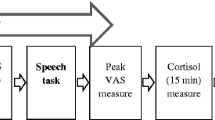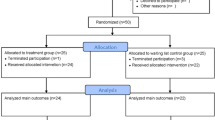Abstract
The present study evaluated the effect of frontal EMG biofeedback and relaxation training on a group of 20 anxious patients experiencing stressful life events. The patients were divided into two groups, high and low in stress, based on their life change score on the Recent Life Changes Questionnaire. Patients were evaluated at pre, post, and 6-week follow-up. Treatment consisted of 10 sessions of biofeedback-assisted relaxation. Results indicated that the high stress group showed pre to post changes on anxiety, depression, symptoms, and EMG, while low stress showed no change. Post to follow-up comparisons showed maintenance of improvement for the high stress group and no change for low stress. From pre to follow-up assessment, the high stress group showed significant changes. Both groups reported internal attributions following biofeedback and relaxation training. The high stress group attributed their improvement to the belief they were in control of their minds and bodies, while the low stress group most frequently reported the effort put into the task. The results indicate support for a cognitive explanation for some of biofeedback's effects.
Similar content being viewed by others
References
Alexander, A. B. An experimental test of assumptions relating to the use of electromyographic biofeedback as a general relaxation training technique.Psychophysiology 1975,12 656–662.
Beck, A. T., & Beck, R. W. Screening depressed patients in family practice.Postgraduate Medicine 1972,52 81–85.
Budzynski, T. H.Relaxation training program (BMA Audio Cassette Programs). New York: Bio Monitoring Applications, 1978.
Budzynski, T. H., & Stoyva, J. An instrument for producing deep muscle relaxation by means of analog information feedback.Journal of Applied Behavior Analysis 1969,2 231–237.
Canter, A. Kondo, C. Y., & Knott, J. R. A comparison of EMG feedback and progressive muscle relaxation training in anxiety neurosis.British Journal of Psychiatry 1975,127 470–477.
Chiriboda, D. A., & Pierce, R. C. The influence of stress upon symptom structure.Journal of Clinical Psychiatry 1981,37 723–727.
Gatchel, R. J., Korman, M., Weis, C. B., Smith, D., & Clarke, L. A. A multiple-response evaluation of EMG biofeedback performance during training and stress-inductions.Psychophysiology 1978,15 253–258.
Hauri, P. P. Biofeedback and self-control of physiological functions: Clinical applications. In Z. J. Lipowski, D. R. Lipsitt, & P. C. Whybrow (Eds.),Psychosomatic medicine: Current trends and clinical applications. New York: Oxford University Press, 1977.
Hiebert, B. A., & Fitzsimmons, G. A comparison of EMG feedback and alternative anxiety treatment programs.Biofeedback and Self-Regulation 1981,6 501–516.
Kappes, B., & Michaud, J. Contingent versus noncontingent EMG feedback and hand temperature in relation to anxiety and locus of control.Biofeedback and Self-Regulation 1978,3 51–60.
Lavallée, Y. J., Lamontagne, Y., Pinard, G., Annable, L., & Tetréault, L. Effects on EMG feedback, diazepam, and their combination on chronic anxiety.Journal of Psychosomatic Research 1977,21 65–71.
Lazarus, R. S. A cognitively oriented psychologist looks at biofeedback.American Psychologist 1975,30 553–561.
Mechanic, D. Social psychologic factors affecting the presentation of bodily complaints.New England Journal of Medicine 1972,286 1132–1139.
Mechanic, D. Effects of psychological distress on perceptions of physical health and use of medical and psychiatric facilities.Journal of Human Stress 1978,4 26–32.
Mechanic, D., & Volkart, E. H. Stress, illness behavior, and the sick role.American Sociological Review 1961,26 51–58.
Meichenbaum, D. Cognitive factors in biofeedback therapy.Biofeedback and Self-Regulation 1976,1 201–216.
Miller, M. P., Murphy, P. J., & Miller, T. Comparison of electromyographic feedback and progressive relaxation training in treating circumscribed anxiety stress reactions.Journal of Consulting and Clinical Psychology 1978,46 1291–1298.
Minter, R. E., & Kimball, C. P. Life events, personality traits, and illness. In I. Kutash & L. Schlesinger (Eds.),Handbook on stress and anxiety: Contemporary knowledge, theory, and treatment. San Francisco: Jossey-Bass, 1980.
Nielsen, D. H., & Holmes, D. S. Effectiveness of EMG biofeedback training for controlling arousal in subsequent stressful situations.Biofeedback and Self-Regulation 1980,5 235–248.
Ohno, Y., Tanaka, T., Takeya, T., Matsubara, H., Kuriya, N., & Komemushi, S. Biofeedback modification of frontal EMG in normal subjects.Biofeedback and Self-Regulation 1978,3 61–68.
Passchier, J., & Helm-Hylkema, H. v. d. The effect of stress imagery on arousal and its implications for biofeedback of the frontalis muscles.Biofeedback and Self-Regulation 1981,6 295–303.
Rahe, R. H. Epidemiological studies of life change and illness.International Journal of Psychiatry in Medicine 1975,6 133–146.
Raskin, M., Bali, L. R., & Peeke, H. V. Muscle biofeedback and transcendental meditation.Archives of General Psychiatry 1980,37 93–97.
Reavley, W. The relationship of life events to several aspects of “anxiety.”Journal of Psychosomatic Research 1974,18 421–424.
Reinking, R. H., & Kohl, M. L. Effects of various forms of relaxation training on physiological and self-report measures of relaxation.Journal of Consulting and Clinical Psychology 1975,43 595–600.
Rice, K. M., & Blanchard, E. B. Biofeedback in the treatment of anxiety disorders. In R. J. Mathew (Ed.),The biology of anxiety. New York: Brunner/Mazel, 1982.
Spielberger, C. D., Gorsuch, R. L., & Lushene, R. D.STAI manual. Palo Alto: Consulting Psychologists Press, 1970.
Spilken, A. Z., & Jacobs, M. A. Prediction of illness behavior from measures of life crises, manifest distress, and maladaptive coping.Psychosomatic Medicine 1971,33 251–264.
Stern, G. S., & Berrenberg, J. L. Biofeedback training in frontalis muscle relaxation and enhancement of belief in personal control.Biofeedback and Self-Regulation 1977,2 173–182.
Stern, G. S., Miller, R. C., Ewy, H. W., & Grant, P. S. Perceived control: Bogus pulse rate feedback and reported symptom reduction for individuals with accumulated stressful life events.Biofeedback and Self-Regulation 1980,5 37–49.
Stoyva, J., & Budzynski, T. Cultivated low arousal — An anti-stress response? In L. DiCara (Ed.),Limbic and autonomic nervous system research. New York: Plenum Press, 1974.
Thompson, J. K., Haber, J. D., & Tearnan, B. H. Generalization of frontalis electromyographic feedback to adjacent muscle groups: A critical review.Psychosomatic Medicine 1981,43 19–24.
Townsend, R. E., House, J. F., & Addario, D. A comparison of biofeedback-mediated relaxation and group therapy in the treatment of chronic anxiety.American Journal of Psychiatry 1975,132 598–601.
Author information
Authors and Affiliations
Rights and permissions
About this article
Cite this article
Weinman, M.L., Semchuk, K.M., Gaebe, G. et al. The effect of stressful life events on EMG biofeedback and relaxation training in the treatment of anxiety. Biofeedback and Self-Regulation 8, 191–205 (1983). https://doi.org/10.1007/BF00998850
Issue Date:
DOI: https://doi.org/10.1007/BF00998850




